
Peanuts is a syndicated daily and Sunday American comic strip written and illustrated by Charles M. Schulz. The strip's original run extended from 1950 to 2000, continuing in reruns afterward. Peanuts is among the most popular and influential in the history of comic strips, with 17,897 strips published in all, making it "arguably the longest story ever told by one human being". At the time of Schulz's death in 2000, Peanuts ran in over 2,600 newspapers, with a readership of roughly 355 million across 75 countries, and had been translated into 21 languages. It helped to cement the four-panel gag strip as the standard in the United States, and together with its merchandise earned Schulz more than $1 billion. In 2015, a movie adaptation was released by Blue Sky Studios.
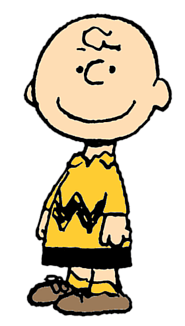
Charles "Charlie" Brown is the principal character of the comic strip Peanuts, syndicated in daily and Sunday newspapers in numerous countries all over the world. Depicted as a "lovable loser", Charlie Brown is one of the great American archetypes and a popular and widely recognized cartoon character. Charlie Brown is characterized as a person who frequently suffers, and as a result, is usually nervous and lacks self-confidence. He shows both pessimistic and optimistic attitudes: on some days, he is apprehensive to even get out of bed because he is unable to face the world, but on others, he hopes to accomplish things and is determined to do his best. Charlie Brown is easily recognized by his round head and trademark zigzag patterned shirt. His catchphrase is "Good Grief!"

Peppermint Patty is a fictional character featured in Charles M. Schulz's comic strip Peanuts. Her full name, very rarely used in the strip, is Patricia Reichardt. She is one of a small group in the strip who live across town from Charlie Brown and his school friends. She has freckles and "mousy-blah" hair, and generally displays the characteristics of a tomboy. She made her first appearance on August 22, 1966. The following year she made her animated debut in the TV special You're in Love, Charlie Brown and began coaching a baseball team that played against Charlie Brown, and thereafter had other adventures with him. Uniquely, she refers to Charlie Brown and Lucy as "Chuck" and "Lucille", respectively. In most of her appearances, she is attracted to Charlie Brown, based on her reactions. Her birthday is October 4.

Marcie is a fictional character featured in the long-running syndicated daily and Sunday comic strip Peanuts by Charles M. Schulz.

Shermy is a fictional character from the comic strip Peanuts, by Charles Schulz. Schulz named him after a friend from high school. When Peanuts made its debut on October 2, 1950, Shermy sat on the curb with another early character, Patty, and spoke the first lines of dialogue, ending with "Good ol' Charlie Brown ... How I hate him!" which is ironic, considering how he became one of Charlie Brown's closest friends, along with Linus van Pelt and Schroeder.

Patty is a fictional character featured in the long-running syndicated daily and Sunday comic strip Peanuts, created by Charles M. Schulz. Patty was formerly a major character whose role was reduced in later years; she never developed a distinct personality like Lucy or Sally. She is sometimes confused with Peppermint Patty, a different and later character with a similar name. Patty appeared in the first Peanuts strip, with Shermy and Charlie Brown, on October 2, 1950.

The Little Red-Haired Girl is an unseen character in the Peanuts comic strip by Charles M. Schulz, who serves as the object of Charlie Brown's affection, and a symbol of unrequited love. The character was first mentioned in the strip on November 19, 1961.

Bon Voyage, Charlie Brown is a 1980 American animated mystery comedy film produced by United Feature Syndicate and distributed by Paramount Pictures, directed by Bill Melendez and Phil Roman. It was the fourth full-length feature film to be based on the Peanuts comic strip and the final one produced during Peanuts creator Charles M. Schulz's lifetime.

It's Flashbeagle, Charlie Brown is the 27th prime-time animated musical television special based upon the comic strip Peanuts by Charles M. Schulz. It originally aired on CBS on April 16, 1984.

A Charlie Brown Celebration is the 23rd prime-time animated television special based upon the comic strip Peanuts, by Charles M. Schulz, who appears in a live-action prologue, and the first hour-long special. It originally aired on the CBS network on May 24, 1982, and consists of a number of stories adapted from the comic strip.

Happy Birthday, Charlie Brown is a prime-time animated TV special based upon the comic strip Peanuts, by Charles M. Schulz. It was originally aired on the CBS network on January 5, 1979.

Snoopy's Getting Married, Charlie Brown is the 28th prime-time animated television special based on the comic strip Peanuts by Charles M. Schulz. It was originally aired on the CBS network on March 20, 1985.

A Charlie Brown Valentine is the 40th animated television special based on characters from the Charles M. Schulz comic strip Peanuts. It features the Peanuts characters during the week leading up to Valentine's Day. It is the second Valentine's Day-themed Peanuts special, following Be My Valentine, Charlie Brown (1975).
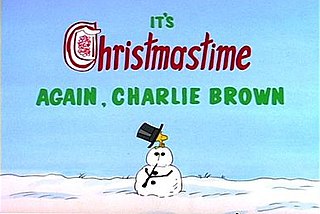
It's Christmastime Again, Charlie Brown is the 36th prime-time animated television special based on the comic strip Peanuts by Charles M. Schulz. It originally aired on CBS on November 27, 1992.

You're in the Super Bowl, Charlie Brown is the 37th prime-time animated television special based on Charles M. Schulz's comic strip Peanuts. It premiered on January 18, 1994, on NBC. It was the last new Peanuts special to air on television until A Charlie Brown Valentine in 2002, and the last before Schulz's death in 2000.
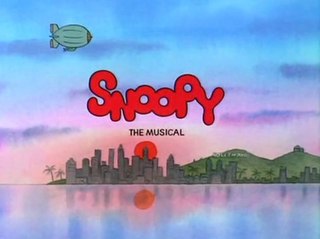
Snoopy! The Musical is the 31st prime-time animated TV special based on characters from the Charles M. Schulz comic strip Peanuts. It is an animated adaptation of the musical of the same name, and originally aired on the CBS network on January 29, 1988.

He's a Bully, Charlie Brown is the 44th prime-time animated television special based on the comic strip Peanuts by Charles M. Schulz. It was originally aired on the ABC network on November 20, 2006. The special is primarily based on a story from the Peanuts comic strips originally appearing in April 1995. He's a Bully, Charlie Brown was an idea Schulz had pitched, and worked on before his death on February 12, 2000. Schulz's working title for the special was It's Only Marbles, Charlie Brown. Animation was produced by Toon-Us-In.
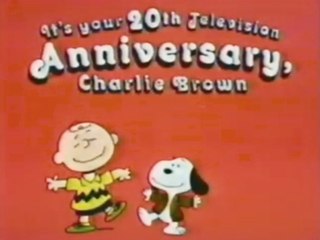
It's Your 20th Television Anniversary, Charlie Brown is an animated documentary television special based on characters from the Peanuts comic strip. Hosted by Peanuts creator Charles M. Schulz, the television special originally aired on the CBS network on May 14, 1985. The special featured highlights of the Peanuts specials produced over the last twenty years.
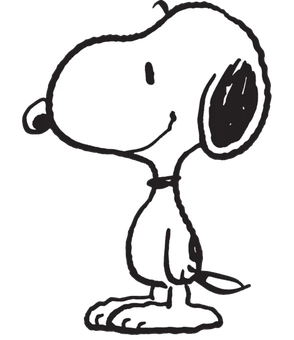
Snoopy is an anthropomorphic beagle in the comic strip Peanuts by Charles M. Schulz. He also appears in all of the Peanuts films and television specials. Since his debut on October 4, 1950, Snoopy has become one of the most recognizable and iconic characters in the comic strip and is considered more famous than Charlie Brown in some countries. The original drawings of Snoopy were inspired by Spike, one of Schulz's childhood dogs.

Snoopy Presents: Welcome Home, Franklin or simply Welcome Home, Franklin is a 2024 animated television special in the Peanuts franchise, the first to center on the African-American character of Franklin Armstrong. The character, introduced in the comic strip on July 31, 1968, was the first Black character in the strip. The special was co-written by Robb Armstrong, Craig Schulz, Bryan Schulz, and Cornelius Uliano from a story by Armstrong and Scott Montgomery, and was directed by Emmy-winner Raymond S. Persi, with Caleb Bellavance starring in the title role. The film was released during Black History Month of 2024.




















